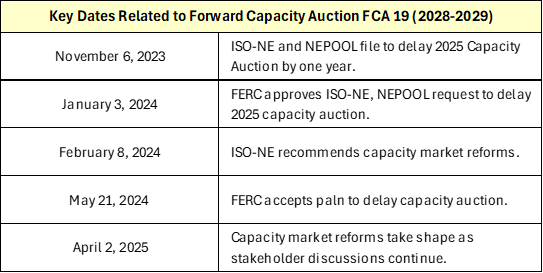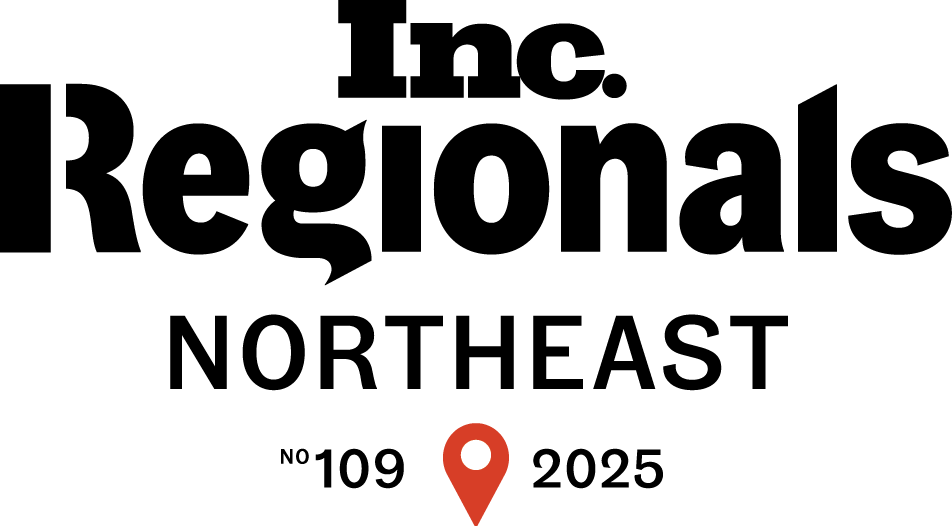ISO-NE Capacity Market Reforms: What FCA 19 Means for 2028–2029
Explore the major reforms ISO-NE is proposing for FCA 19, including a move from a forward/annual to a prompt/seasonal capacity market. Learn how these changes could impact auction timelines, reliability planning, and electricity supply pricing across New England.
ISO New England (ISO-NE) determines the electric generation capacity needed to ensure grid reliability under peak summer and winter demand conditions through its Forward Capacity Market (FCM). Each year, ISO-NE conducts a Forward Capacity Auction (FCA) to secure commitments from energy resources three years in advance. The FCA sets the price at which power resources are compensated by either accepting obligations to supply electricity or curtail demand when called upon by the ISO (Demand Response). All end users pay for that cost of capacity as part of their electricity supply cost. This process is a key mechanism for ensuring the long-term reliability of the New England electric system.
A Look Back: The Origins of FCA 1 Through FCA 18
The first FCA was conducted in 2008 (FCA 1) to secure capacity for the 2010-2011 capacity period which runs from June to the following May establishing the clearing price. Since then, although prices have varied as a result of the auction, by and large the process has remained the same with some modifications; auctions held three years in advance of the commitment period. The last auction, FCA 18, was held in February 2024 for the 2027-2028 period.
A Turning Point: Why ISO-NE Is Reforming FCA 19
All that is about to change. To better ensure power system reliability and cost-efficiency as New England’s resource mix evolves and the number of renewable energy resources increase, ISO New England is proposing Capacity Auction Reforms (CAR) for FCA 19 that would transition the current forward capacity market from a forward/annual market to a prompt/seasonal market with accreditation reforms.
The planning actually started in late 2023 with ISO-NE and NEPOOL filing a request to the Federal Energy Regulatory Commission (FERC) to delay FCA 19 that would have taken place in February this year, which FERC accepted. The delay gives ISO-NE and stakeholders time to develop a new structure for the region’s capacity market.
Planned Changes
Major objectives include procuring capacity in a timelier manner and updating capacity accreditation methods to better align capacity with resource adequacy contributions.
This reform initiative has three primary components that would be in place for the Capacity Commitment Period (CCP) scheduled to start on June 1, 2028 – May 31, 2029.
- Prompt Auction: Instead of three years in advance, the capacity auction would take place shortly before the capacity commitment period, reflecting more accurate information about projected electricity supply and demand.
Holding the auction closer to the commitment period will allow ISO-NE to use more up to date information about projected demand and supply requirements, reducing the risk of planning three years in advance. Additionally, it reduces the risk for developers of new resources by shortening the time between the auction and the delivery period.
- Seasonal CCP: The CCP changes from annual to sub-annual (seasonal) commitment periods to better address the distinct reliability challenges of winter and summer, as well as variations in resource performance from season to season.
The current system procures capacity annually, ISO-NE has proposed moving to two separate commitment periods per year with two auctions to better address the distinct reliability challenges of summer and winter. The proposed commitment periods extend from May 1 to Oct. 30 (Summer) and Nov. 1 to April 30 (Winter). Separate auctions would be conducted for each season. This change will be very important as ISO-NE is anticipating a shift to a winter peaking region by 2032. The first auction would take place one or two months in advance of June 1, 2028.
In addition to the prompt auction, the seasonal market will ensure that the capacity market procures the right mix of resources to meet the specific needs of each season, optimizing for cost and reliability.
- Accreditation Reforms: It is critical to the reliable and efficient clean-energy transition that the capacity accreditation methodologies are updated to reflect evolving resources’ capabilities and how those capabilities contribute to resource adequacy.
The CAR also changes the way resources will be able to enter and exit the capacity market. The current process requires a resource to notify ISO-NE more than four years before it plans to exit the capacity market. The proposed new process shortens the notification period to two years. Review processes would remain in place to deter attempts at market manipulation and safeguard against deactivations that jeopardize transmission security. The shorter notification period balances the time needed for the ISO to complete these reviews and for market participants to react to deactivation decisions.
Effects on the Clearing Price
Although there may be potential for lower costs by reducing uncertainty and risk, as well as reflecting more accurate demand patterns and the changing resource mix, ISO-NE anticipates that a prompt auction is unlikely to reduce the capacity clearing price. This will undoubtedly continue to unfold as the parameters and methodologies of the auction process are developed.
Because of the uncertainty of the CAR and the clearing prices resulting from the auctions, most suppliers are not including or fixing the cost of capacity beyond June 1, 2028, in their fixed price quotes. Instead, they are electing to either pass the actual cost of capacity through to the end-user beyond June 2028 or including it initially with a bi-lateral true-up to reflect actual costs.
Since FCA 1 for the 2010-2011 commitment period, clearing prices have varied considerably each year with variations between the eight Load Zones in New England. If more details become available regarding clearing prices for FCA 19, we will provide periodic updates.
Meet the Writer

Howard Plante
Freedom Energy Logistics
Vice President of Procurement
Howard Plante is a seasoned professional in the energy industry with a comprehensive background in environmental and energy engineering. As Vice President of Procurement at Freedom Energy Logistics, he brings a wealth of experience in regulatory compliance, technical analysis, and strategic planning to his role, where he is dedicated to advocating for clients and advancing the company’s enterprise efforts on their behalf. Click here to read Howard’s full bio.







Connect With Us